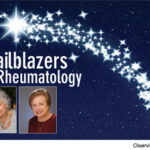“I suspect some of you are busy, [in] fast-paced [practices] and juggling lots of different things, and we work, and we think that there’s a separation of work and play. I’d like to propose that we add play to our work,” Dr. Hahn said. “Some of my greatest moments have involved colleagues who’ve incorporated play into their workday.
“It helps us be resilient,” she said. “It helps us be creative. It helps us with this intellectual creativity,” she added. “It also helps us be a part of a community, which I think everyone in this room is.”
As difficult as it might be to hit the brakes during a chaotic workday, breaks are vital to being the best doctor you can be, Dr. Hahn added. “It helps those in the very fast-paced world of health and medicine to stop to pause to truly look at patients to really understand and listen,” she said.
Dr. Hahn said she teaches a fourth-year medical student elective course at UF called the “Art of Advanced Physical Diagnosis and Clinical Reasoning,” which includes spending time at an art museum. “The bedside requires deep attention, deep listening and deep observation, and that’s what we try to get across,” she said.
Dr. Hahn said that if she thinks a patient would benefit from writing, she hands them a blank piece of paper and a pen and asks them to write down their thoughts. They can even draw if they want to, she said. This way, Dr. Hahn said she gets a sense of patients’ struggles, desires and fears.
‘Some of my greatest moments have involved colleagues who’ve incorporated play into their workday.’ —Dr. Hahn
One patient wrote about the frustrations of “not having my family together” and “being blocked by physical restrictions” and “feeling unmotivated.” On the other hand, they wrote, they were still grateful for their children and “my furry friends” and “that I’m alive.”
Another wrote about things they’d like to do. “Be happy, hear less complaining and negativity. Exercise. Read more. Be more relaxed. Pray. Take care of me. Don’t rush. Breathe.”
Dr. Hahn said she still benefits from the lessons she learned from Monica, the UF student. “She taught me how to slow down,” she said. “She gave me this quiet sense of urgency in a way that was a calming urgency, one to truly experience every single, solitary day to its fullest and not worry about the things you can’t do, but take on the things you can do, the things we help patients do on a regular basis.”
Audience Reactions
After the talk, audience member David Yu, MD, emeritus professor of medicine at University of California Los Angeles, said he asks patients what their “most recent stressor” is, and he often finds that it’s an issue in their personal life and not something medical. Sometimes, he said, “I just stop talking” as an invitation for his patient to talk.
